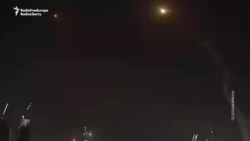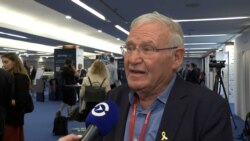Thank You For Joining Us
- By RFE/RL
That is the end of our live coverage for June 13 of the Israeli air strikes on Iran, and Tehran's retaliation.
Thank you for joining us.
Israel Says Iran Retaliates With Two Waves Of Missiles, 'Most' Intercepted
- By RFE/RL
Israel's military spokesman, Brigadier General Effie Defrin, said Iran launched two salvos of surface-to-surface missiles, "most of which were intercepted by air defense systems or did not arrive." Defrin said each wave of missiles numbered around 100. However, Israel's firefighting service said was responding to several "major" incidents resulting from an Iranian missile attack, including efforts to rescue people trapped in a high-rise residential building.
There were no immediate reports of casualties.
Trump Calls On Tehran To Negotiate 'Before It's Too Late' As Israeli Strikes Intensify
- By RFE/RL
US President Donald Trump warned Iran to make a nuclear deal "before it is too late" as Israel continued to conduct air strikes on Iranian nuclear facilities and other sites across Iran that have already killed a top general and two other military officials.
Meanwhile, US officials told news agencies that US ground-based air defense systems were helping to shoot down missiles that Iran had fired off in retaliation toward Israel.
One of the officials told AP -- speaking on the condition of anonymity -- that US jets and warships had not so far been used in the operation, but further details were not immediately available.
Separately, a White House official said Trump spoke with Israeli Prime Minister Benjamin Netanyahu by phone, but details of the call were not disclosed.
Trump also spoke with French President Emmanuel Macron and British Prime Keir Starmer and about the situation, officials said.
Iran reportedly launched scores of drones and missiles at Israeli sites in response to the June 13 attacks.
To read the full story, click here.
'We've Grown Used To It,' Tel Aviv Residents Say After Iranian Missile Attack
Following a barrage of Iranian missile strikes, loud explosions and rising clouds of smoke were witnessed in the Israeli city of Tel Aviv. Local residents told RFE/RL that the situation in the city was "very scary," yet "not unfamiliar."
Karin David, a Tel Aviv resident, said she felt "very stressed" as the sound of explosions echoed through the city's neighborhoods.
"I didn’t feel well. I cried a little and was very stressed, but luckily, I was with my friends," she said. "The current situation is scary and unpleasant, but I trust the Israel Defense Forces and follow all official instructions."
Alina Shaul, another Tel Aviv resident, said the strikes were intense but not unfamiliar. "Sadly, we’ve grown used to it," she added.
"This isn’t the first time, nor is it the most dramatic. Even an Iranian attack no longer feels out of the ordinary." Shaul said.
"It’s strange how routine it has all become. The hardest part is not knowing how long we’ll be in the shelter -- ten minutes? An hour? More? That uncertainty never gets easier."
Blasts Heard In Tel Aviv As Iran's Khamenei Vows Revenge
- By RFE/RL
The Israeli military says Iran launched dozens of ballistic missiles at Israel as sirens and loud blasts were heard in Jerusalem and Tel Aviv.
Minutes later, a massive cloud of smoke rose over Tel Aviv. According to Iranian media, hundreds of ballistic missiles were launched from Iran toward Israel, marking Tehran's initial response to the intense Israeli attacks.
Following the attack, Iran's Supreme Leader Ayatollah Ali Khamenei said that Israel "initiated a war" and that it would not be permitted to carry out "hit-and-run" strikes without facing severe consequences.
"[Israel] will not remain unscathed from the consequences of its crime. The Iranian nation must be guaranteed that our response will not be half-measured," Khamenei said in a statement.
The Israeli military added that the attacks were ongoing, with dozens more missiles launched toward the country.
Iranian Foreign Minister Calls For UN Action Against Israel For 'Warmongering'
- By RFE/RL
Iranian Foreign Minister Abbas Araqchi says he held a phone call with United Nations Secretary General Antonio Guterres where he called for the UN to take urgent action "in fulfilling its duties to safeguard international peace and security."
In a statement on Telegram, Araqchi accused Israel of "warmongering" while committing "a gross violation of Iran's sovereignty and territorial integrity" with its attacks on June 13 against Iranian nuclear and military facilities.
Israeli Prime Minister Benjamin Netanyahu said the strikes were aimed "to roll back the Iranian threat to Israel's very survival and that they would continue "for as many days as it takes to remove this threat."
Israel Confirms It Has Targeted Iran's Isfahan Nuclear Facility, Gives No Further Details
- By RFE/RL
Israel has launched air strikes at the Isfahan nuclear facility in Iran, Lieutenant Colonel Nadav Shoshani, the international spokesperson for the Israel Defense Force, said in a statement.
"We can now confirm, IDF has carried out strikes against the nuclear plant in Isfahan. This is in addition to operations in Natanz," he said in a social media post. He gave no further details.
Iran has not commented on the statement.
Evelyn Farkas, Executive Director Of The McCain Institute
Israel's military action against Iran was driven by little hope for a diplomatic resolution to Tehran’s nuclear ambitions, said Dr. Evelyn N. Farkas, executive director of the McCain Institute and former US Deputy Assistant Secretary of Defense.
In an interview with RFE/RL, Farkas said that the world was "not succeeding on the negotiating front," adding that Iran was approaching the threshold for uranium enrichment.
“The window was closing for the world to do anything about Iran's nuclear program. So Israel took matters into their own hands,” she said.
Farkas further added that Israel likely saw the moment as a strategic opportunity. “If you're going to take military action against those targets and you think that diplomacy isn’t working, this is a logical time,” she said.
However, she also warned against further escalation and urged the need to return to diplomacy to avoid broader regional destabilization.
Later in the day, Israel’s National Security Adviser Tzachi Hanegbi acknowledged that Iran’s nuclear program cannot be fully destroyed through military means. However, he added it could help to “create the conditions” for a long-term agreement.
Kremlin Says Putin Condemns Israeli Attacks On Iran, Urged Netanyahu, Pezeshkian, To Find Diplomatic Solution
- By RFE/RL
Russian President Vladimir Putin held telephone conversations with Iranian President Masud Pezeshkian and Israeli Prime Minister Benjamin Netanyahu and urged a de-escalation of tensions as Israel continues to attack Iranian nuclear and military targets.
The Kremlin said in a statement that Putin had "condemned" the attacks, saying they violated international law.
The statement added that Putin told Netanyahu issues related to the Iranian nuclear program should be resolved "exclusively through political and diplomatic means."
Israel's Doubts Over Iran Talks Drove Preemptive Action, Says Former Head Of Israeli Military Intelligence
- By Current Time
Israel did not believe Iran would negotiate a "better deal" on its nuclear enrichment program, which is why it acted, said Amos Yadlin, former head of Israeli military intelligence and president of a security consulting agency MIND Israel.
In an interview with Current Time, Yadlin added it is now up to the Iranian leadership to avoid escalating the conflict into a broader regional war.








Forum